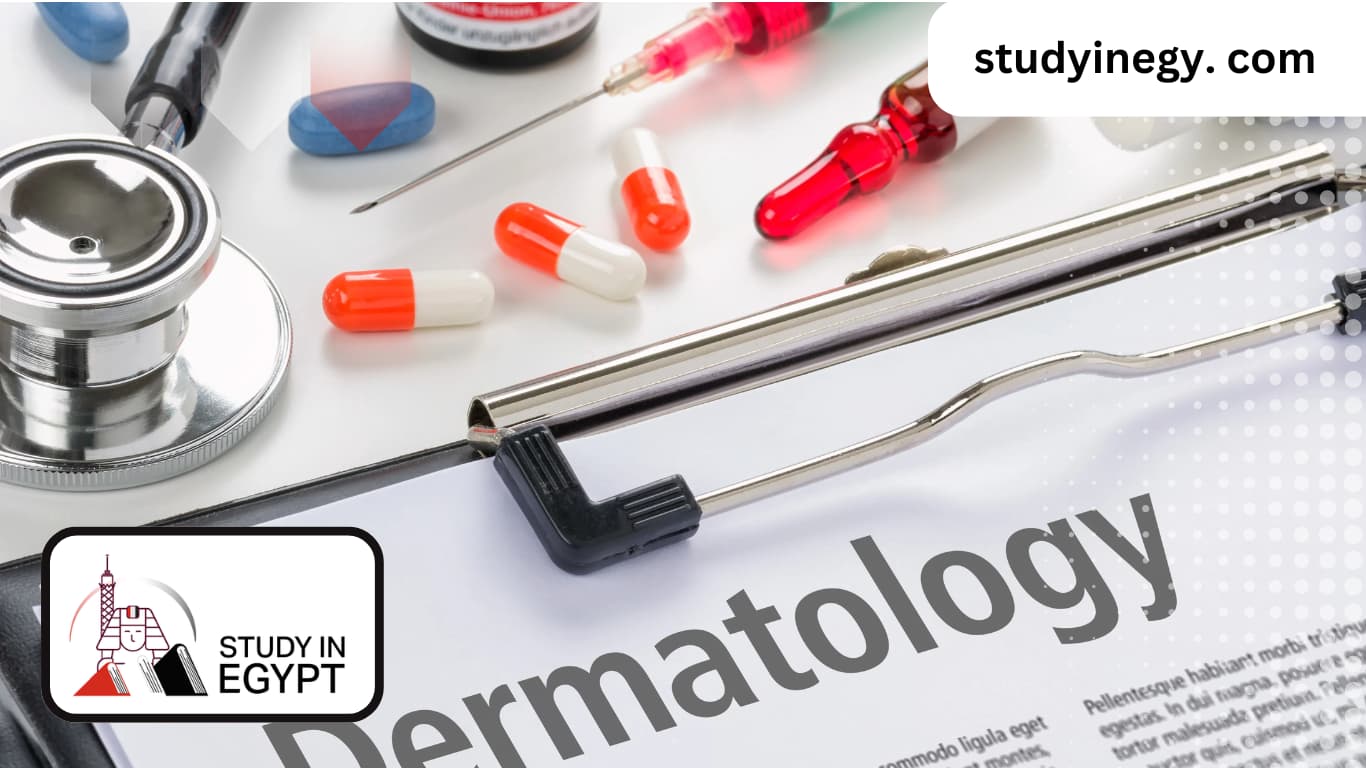Study dermatology in Egypt … Dermatology is one of the most prominent branches of medicine, focusing primarily on understanding the structure of the skin, hair, and nails and diagnosing and treating diseases that affect them.
This distinguished specialty integrates both the therapeutic and cosmetic aspects, as the dermatologist deals with common conditions such as infections, allergies, acne, and other skin diseases, as well as more complex cases like skin tumors and autoimmune disorders. The field also includes modern techniques in laser treatments, cosmetic care, and hair transplantation. Its importance lies in the fact that the skin is the body’s first line of defense, making a patient’s overall health strongly linked to the integrity of the integumentary system.
The faculties of medicine in Egyptian public and private universities are among the most prominent educational destinations at the regional and international levels in the field of teaching dermatology, as they offer all academic degrees (bachelor’s, master’s and doctorate) in the field of dermatology.
Why to Study Dermatology at Egyptian Universities?
Egyptian universities offer several important characteristics and advantages for students seeking a comprehensive and integrated academic experience on par with studying at the best universities in Europe and the United States.
The most prominent of these features:

- A comprehensive and integrated scientific curriculum that provides all vital medical information. These Egyptian medical colleges also provide the best and most advanced clinical practical training in the Middle East.
- Practical training is conducted in Egyptian government hospitals, which receive countless numbers of patients with various conditions daily, and all the most advanced medical equipment and devices are available.
- This integrated practical training provides great academic and practical value and refinement, as the student is fully and professionally qualified to practice this vital profession that is in demand in the regional and international labor market.
- Students study these curricula, which are aligned with the most important international standards and models, under the direct academic supervision of an elite group of medical academics, considered among the most competent and best in the Middle East. This teaching staff strives to provide students with the necessary scientific and practical expertise to ensure a beneficial and easy educational experience that qualifies them for the job market.
Other Advantages
- Egyptian universities, especially medical colleges, are distinguished by their advanced scientific infrastructure and scientific centers and laboratories equipped with the latest equipment and technologies. They are also distinguished by their huge libraries that include all sources and references of specialized information in the field of medicine with the aim of facilitating the process of scientific research and refining it.
- In addition to these important advantages, most of the faculties of human medicine in Egypt (especially the public ones) are included in all international university rankings of the world, including QS, Times, Shanghai, Leiden, US News, and others. Therefore, these faculties, which are also registered, like the largest faculties of human medicine under the UNESCO agreement, are treated in the regional and international labor markets just like the largest European and American medical schools.
The most important subjects in the field of dermatology
Introduction to Dermatology
- Structure and functions of the skin, hair, and nails.
- Physiology and histology of the skin.
General Dermatology
- Skin infections (bacterial, viral, fungal, parasitic).
- Allergic conditions, eczema, and psoriasis.
- Autoimmune diseases affecting the skin (e.g., lupus).
- Genetic skin disorders.
- Pediatric dermatology.
Sexually Transmitted Diseases (Venereology)
- Syphilis.
- Gonorrhea.
- Chlamydia.
- Genital herpes.
- Genital warts (HPV).
- HIV and associated dermatological conditions.
Dermatologic Oncology
- Benign and malignant skin tumors.
- Melanoma and other types of skin cancer.
Cosmetic Dermatology
- Skin and hair care.
- Laser therapy and chemical peeling.
- Fillers and botulinum toxin (introduced at a preliminary level or in later courses).
The best Egyptian medical colleges in dermatology
Public Universities
- School of Medicine, Kasr Al-Ainy – Cairo University (ranked as the best medical school in the Middle East).
- School of Medicine, Ain Shams University.
- School of Medicine, Helwan University.
- School of Medicine, Alexandria University.
- School of Medicine, Zagazig University.
- School of Medicine, Menoufia University.
- School of Medicine, Al-Azhar University.
- School of Medicine, Mansoura University.
- School of Medicine, Beni Suef University.
Private Universities
- School of Medicine, Misr International University.
- School of Medicine, Misr University for Science and Technology.
- School of Medicine, Badr University.
- School of Medicine, October 6 University.
- School of Medicine, Nahda University.
- School of Medicine, Merit University.
- School of Medicine, New Giza University.
- School of Medicine, The British University in Egypt.
- School of Medicine, Pharos University.
- School of Medicine, Future University.
Tuition Fees to Study Dermatology in Egypt for International Students
Despite the advantages of studying medicine in Egypt, including dermatology, the tuition fees remain affordable and relatively low compared to similar programs of the same academic level and internationally recognized degree.
An international student is required to pay a one-time registration fee of USD 1,500 in the first academic year, in addition to annual tuition fees ranging between USD 6,000 and USD 8,000.
Admission Requirements to Study Dermatology in Egypt for Non-Egyptians
- The student must not hold Egyptian nationality.
- A valid passport is required.
- A high school certificate with a minimum acceptance rate of 75% is required for admission to the bachelor’s program.
- A bachelor’s degree with a minimum grade of “Pass” is required for admission to the master’s program.
- The international student must hold a master’s degree with a minimum grade of “Pass” to be admitted to the doctoral program.







